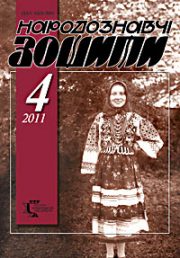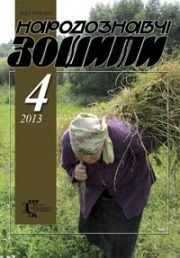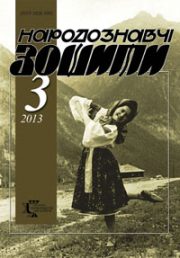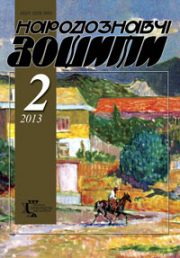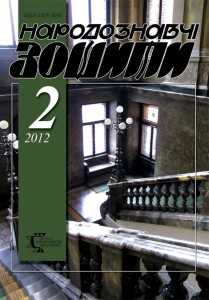
Content
Pavluk Stepan. On achievement of ukrainian ethnology: twenty years of self-denying work. P. 171-190
The article has presented some most high scientific achievements of the Ethnology Institute of NASU during twenty years if its existence. Light has been thrown upon the problems arisen in the institution through the mentioned period.
Keywords: people’s traditional culture, intellectual resource, ethnological link, book-publishing.
read »
Chmelyk Roman. On the impact of changes in type of Ukrainian-Polish borderland upon transforming of own/other/alien category. P. 191-200
In the article have been considered some problems as for dependence and transforming of own/other/alien category caused by the changes in type of Ukrainian-Polish borderland during the second half XX and early XXI cc. Applying theoretic and methodological elaborations by European and American scholars the author has tried to use those in analyzing of his own field data.
Keyword: type of borderland, Ukrainian-Polish frontier zone, own/ other/ alien category.
read »
Radovych Roman. On traditional dwellings in the North of ethnographic Volhynia: some peculiarities and parallel traits of Volhynian Polisian(second half XIX to the late XX cc.). P. 201-217
In the article have been considered some peculiarities of traditional housing in the Northern part of ethnographic Volhynia (within the borders of Rivne and Volhynia administrative units). Main typological characteristics (as design, heating system, techniques and technology of building, ceiling and roof constructions) are allocated to specific features. Comparative analyses of main constructive aspects common to Northern Volhynia and Polisia have been performed.
Keywords: Volhynia, dwelling, constructions, design, heating system.
read »
Horbal Maria. Didukh (forefather) and kutya in Christmas rityalism of Lemko land. Typology and semantics. P. 218-226
In the article have been considered some semantic meanings of customary ritual Christmas attribute t.i. the didukh object with corresponding temporal definitions — from primal meaning in the period of final passage to agriculture till present. Under analytical study have been put semantic features of kutya being most ancient ritual eating by first ploughmen, the dish that had come into Slavs’ familial life yet on the stage of developed gathering (while didukh had appeared in more late time). All-Slavonic ground of these attributes has been underlined.
Keywords: part of the harvest by deceased parents, spirit of forefather, symbol of welfare, ritual eating, all-Slavonic ground.
read »
Kyrchiv Roman. Field notes and materials from the crossroads of ethnical cultures. P. 227-240
In the article have been presented some ethnological notes and texts (ethnographical as well as folkloristic ones), fixed during the two short-term research travels of 1988—1999 in surroundings of Węgorzewo and Bielsk Podlaski towns (Poland). First of localities is worth of notion because of certain concentration of resident Ukrainians settled there in the course of deportation out of their native lands in result of notorious Wisła action at 1947. In the second site of interest for us was the state of Ukrainians’ ethno-cultural identity kept along the territories of Northern Podlachia, i.e. a part of so-called Transcurzonia, that had not suffered the mentioned deportation.
Key-words: cultural identity, concentrated dwelling , deportation, assimilation, ethnical self-consciousness, community life.
read »
Hodovanska Oksana. On the newest Ukrainian diaspora in the Kingdom of Spain. P. 241-248
The formation of Ukrainian diaspora in Spain had begun after the World War II. Since the early 90s of XX c. in Spain have arrived numerous labour migrants from Ukraine. In the Kingdom of Spain there are as for now sixteen public organizations of our compatriots and «The Federation of Ukrainian associations of Spain» uniting nine Ukrainian societies. The newest Ukrainian diaspora in Spain is highly structured and functioning ethnical organism that has quite harmoniously added itself to the world Ukrainian diaspora.
Keywords: newest Ukrainian diaspora, Spain, labour migrants, Ukraine.
read »
Sapeliak Oksana. On preventive educational system of Salesian Society. P. 249-255
In the article have been put some problems not yet considered in Ukrainian ethnology as for preventive educational system in upbringing of children and adolescents founded by Italian clergyman, saint Giovanni Bosco.
Keywords: preventive educational system, repressive educational system, Don Bosco, Salesians.
read »
Markov Ihor. On peculiarities of social identities by the present-day Ukrainian migrants in the states of EC. P. 256-260
In the article have been considered some peculiarities of social self-definition by ethnical national group of the present-day Ukrainian labour migrants in the EC states against the background of migrant from the states of Central Europe/
Keywords: present-day Ukrainian labour migration, traditional diaspora, ethnical community, social networks, socio-cultural forms of self-organization
read »
Levkovych Nadia. Female demonological characters of Carpathian Ukrainians. P. 261-267
By consideration and analyzing in the whole system of demonological characters in population of Carpathian Ukrainians the author has traced division of demonic creatures in feminine and male ones. This separation is quite picturesque example of the binomial opposition of the world as entity of male and female beginnings. Main attention in the article has been paid to description of imaginative notions of Ukrainian highlanders as for female characters of differentiated demoniac levels.
Keywords: demonology, Ukrainians of Carpathians, female demonological characters, «dyka baba», «perelesnytsya», «mayka», «povitrulya», «bosurkanya», «vorozhka».
read »
Kovalchuk Olha. On order in versifying and sound organization of kolomyika songs. P. 268-276
The subject of this research-work are orders in versifying and phonic arrangement of kolomyika songs. In the article have been considered form, structure, method of prosody, rhythm, melodн, variability, rhyming, sound imaging techniques. The paper has shows that despite of canonized form and structure, thematic and image-bearing diversity of sung creations still can be achievable , not least by the numerous phonic means.
Keywords: kolomyika form, kolomyika structure, way of versification, rhythm and melody, variability, rhyming, sound imaging techniques.
read »
Snihyrova Lilia. Lyric and epic hero in ukrainian folk historical songs of XV to the early XVIII cc. P. 277-285
The attempt of systemic consideration a lyric and epic hero in a separately taken genre — historical song — has been presented by this article. The author has traced the origin and the creation of lyro-epic hero’s image in Ukrainian folk historical songs through XV to early XVIII cc. with definition of basic signs as for folk hero and pointing the dominant typological features distinctive in lyric and epic hero of historical songs.
Keywords: hero, cossack, lyro-epic work, historical song.
read »
Kuzmenko Oksana. Episode as a structural dominant of folklore narratives on the First World War. P. 286-293
Author of the article has considered compositional features of folklore narratives about World War I. Under analysis have been put several peculiarities characteristic for retaining in the collective memory and folklore tradition some most significant episodes from the historic past about war and army Attempt has been made to segregate and classify wide-spread typical structural elements. It has been found that in case with the memoire-stories their composition had included a set of plots with tendency to grow into separate independent one-episode works. In historical narrations (oral deliveries) the text has appeared in form of a brief «big episode summary» with traits of semantically and prosodically underlined image constants.
Keywords: folklore narrative, narration, memoire, text, episode, structure, motif, image, intertextuality, collective memory, narrative tradition.
read »
Patsay Tamara. On particularities of ethnographic research-works by Shevchenko Scientific Society at interwar period (according to Transactions of sessions of Ethnographic commission). P. 294-299
The article has thrown some light upon some most characteristic activities by ethnographic commission of SSS during the period of 1918—1939. Main problems and achievements of Ukrainian ethnography at interwar period have been represented. The study has been at large based on archival data.
Keywords: Ethnographic commission, Shevchenko Scientific Society, ethnology, F. Kolessa, V. Hnatiuk.
read »
Kharchyshyn Olha. Teodor Furta, folklore performer as a representative of traditional folk song culture in the ukrainian city (the street musician is 102 years old). P. 300-316
In the article written on the basis of author’s own field studies in Ukrainian folklore has been discovered a creative phenomenon by street musician Teodor Furta, still active representative of oral folk tradition and urban subculture in Lviv. Thus by means of this person being true living carrier of folk song values an attempt has been made to prove the important role of Ukrainian folklore tradition for establishing the modern ethnical culture in Ukrainian city.
Keywords: Teodor Furta, repertoire, song tradition.
read »
Pukivsky Yurii. On pre-Easter Lent in traditional calendar by Ukrainians of historio-etnographical Volhynia. P. 317-328
This paper deals with traditions of pre-Easter Lent among inhabitants of Volhynia. Local peculiarities of different fasting customs and rites have been discovered. Through the use of archival ethnographic materials and field fixations some new data as for corresponding traditions and ones’ development as well as modifications during XX c. and current state have been prasented traced. Symbolic meanings of rituals that belong to period of the fasting have been put under analysis.
Keywords: Volhynia, Lent, customs, prohibitions, traditional foods, Palm Sunday, pure Thursday.
read »
Movna Ulana. On Ukrainian natal text: a wax candle. P. 329-336
In the article has been considered a symbolic role of wax in the context of Ukrainians natal ritualism, i. e. during preparation to childbirth and delivery as well as postnatal acts of protective character, in the cource of ritual exchange between a lying-in woman and a midwife, in christening and baptismal treating and first rites of initiation. Polysemantic variability of wax in ritualistic life of Ukrainian peasantry has been exposed — wax as ritual symbol of light, as projection of Heavenly Fire with its archaic protective function of magical guardment and salvation, as a mediator in passage of woman in childbirth to her new life state — that of a mother.
Keywords: wax, candle, Ukrainian familial text, rite, christening, semantics, mediator.
read »
Horoshko Lessia. On ritual usage of water in the context of theophany celebrations in the territory of Cherkasy region. P. 337-352
In the article based on published sources and author’s own field data got during the research-works in Cherkasy land (Korsun’-Shevchenko, Kaniv, Zolotonosha regions) at 2008—2010 have been studied some phenomena in ceremonial rites with water through Theophany celebrations. The author has claimed that water is generally used for cure as well as with purifying or protective aims and more rarely because of its producing properties.
Keywords: water, Theophany, wash, sprinkle, charm, cleaning, treatment.
read »
Vynohradska Halyna. On unpublished chapter «Harvest» in A. Krymsky’s work «Zvenyhorod region — Shevchenko’s native land from ethnographic and dialectological points of view». P. 353-360
The author of publication has presented «The Harvest», for the first time completely published chapter of A. Krymsky’s work «Zvenyhorod region — Shevchenko’ native land from ethnographic and dialectological points of view» to scientific community. In the article under analysis have also been put source data as for known print sets of this work as well as notions on the usage of text of mentioned chapter in newest ethnologic and folkloristic studies.
Keywords: A. Krymsky, Zvenyhorod region, harvest.
read »
Pastukh Nadiya. New authoritative edition by researchers of mythology and folklore. P. 361-366
read »
Faynyk Tetyana. Book of Reminiscences by Archbishop-Missionary. On occasion o reading. P. 367-371
read »
